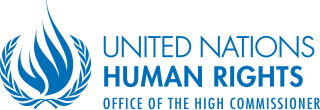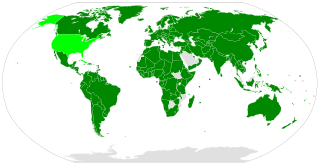Related Research Articles

The Office of the United Nations High Commissioner for Human Rights (OHCHR) is a department of the United Nations Secretariat that works to promote and protect human rights that are guaranteed under international law and stipulated in the Universal Declaration of Human Rights of 1948. The office was established by the United Nations General Assembly on 20 December 1993 in the wake of the 1993 World Conference on Human Rights.

The Unrepresented Nations and Peoples Organization, or simply UNPO is an international organization established to facilitate the voices of unrepresented and marginalized nations and peoples worldwide. It was formed on 11 February 1991 in The Hague, Netherlands. Its members consist of indigenous peoples, minorities, and unrecognised or occupied territories.
The United Nations Human Rights Committee is a treaty body composed of 18 experts, established by a 1966 human rights treaty, the International Covenant on Civil and Political Rights (ICCPR). The Committee meets for three four-week sessions per year to consider the periodic reports submitted by the 173 States parties to the ICCPR on their compliance with the treaty, and any individual petitions concerning the 116 States parties to the ICCPR's First Optional Protocol. The Committee is one of ten UN human rights treaty bodies, each responsible for overseeing the implementation of a particular treaty.
International human rights law (IHRL) is the body of international law designed to promote human rights on social, regional, and domestic levels. As a form of international law, international human rights law is primarily made up of treaties, agreements between sovereign states intended to have binding legal effect between the parties that have agreed to them; and customary international law. Other international human rights instruments, while not legally binding, contribute to the implementation, understanding and development of international human rights law and have been recognized as a source of political obligation.

The United Nations Human Rights Council (UNHRC) is a United Nations body whose mission is to promote and protect human rights around the world. The Council has 47 members elected for staggered three-year terms on a regional group basis. The headquarters of the Council are at the United Nations Office at Geneva in Switzerland.

The International Commission of Jurists (ICJ) is an international human rights non-governmental organization. It is supported by an International Secretariat based in Geneva, Switzerland, and staffed by lawyers drawn from a wide range of jurisdictions and legal traditions. The Secretariat and the Commission undertake advocacy and policy work aimed at strengthening the role of lawyers and judges in protecting and promoting human rights and the rule of law. In addition, the ICJ has national sections and affiliates in over 70 countries.

The International Covenant on Economic, Social and Cultural Rights (ICESCR) is a multilateral treaty adopted by the United Nations General Assembly (GA) on 16 December 1966 through GA. Resolution 2200A (XXI), and came into force on 3 January 1976. It commits its parties to work toward the granting of economic, social, and cultural rights (ESCR) to all individuals including those living in Non-Self-Governing and Trust Territories. The rights include labour rights, the right to health, the right to education, and the right to an adequate standard of living. As of February 2024, the Covenant has 172 parties. A further four countries, including the United States, have signed but not ratified the Covenant.

The Act of Free Choice was a controversial plebiscite held between 14 July and 2 August 1969 in which 1,025 people selected by the Indonesian military in Western New Guinea voted unanimously in favor of Indonesian control.

The United Liberation Movement for West Papua (ULMWP) is an organization formed from the merger of three political independence movements seeking independence for Western New Guinea from Indonesia. The ULMWP was formed on 7 December 2014 in Vanuatu uniting the Federal Republic of West Papua (NRFPB), the West Papua National Coalition for Liberation (WPNCL) and the National Parliament of West Papua (NPWP).

The United Nations Permanent Forum on Indigenous Issues is the UN's central coordinating body for matters relating to the concerns and rights of the world's indigenous peoples. There are more than 370 million indigenous people in some 70 countries worldwide.

United Nations Administered West New Guinea refers to the period between 1 October 1962 and 1 May 1963 when Western New Guinea was administered by the United Nations Temporary Executive Authority (UNTEA) in accordance with in article two of the New York Agreement reached between the governments of the Netherlands and Indonesia in August 1962.

The Papua conflict is an ongoing conflict in Western New Guinea (Papua) between Indonesia and the Free Papua Movement. Subsequent to the withdrawal of the Dutch administration from the Netherlands New Guinea in 1962 and implementation of Indonesian administration in 1963, the Free Papua Movement has conducted a low-intensity guerrilla war against Indonesia by targeting its military and police, along with ordinary Indonesian citizens.

Viktor Kaisiepo, also spelled Victor Kaisiepo, was a Netherlands New Guinean-born Dutch activist for West Papuan independence and self-determination. His family fled West Papua when its administration was transferred to Indonesia, and he lived in the Netherlands thereafter.

The Khmers Kampuchea-Krom Federation (KKF) is an organization that self-declares as representing the indigenous Khmer Krom peoples living in the Mekong Delta of Vietnam. Its primary mission is to advocate for human rights, religious freedom, and self-determination and independence through peaceful means and international laws.

East Timor is a multiparty parliamentary republic with a population of approximately 1.1 million, sharing the island of Timor with Indonesia's East Nusa Tenggara province. During the 24 years of Indonesian occupation and after the 1999 independence referendum, pro Indonesian militias committed many human rights violations. The country gained independence in 2002, and free and fair elections were held in 2007. The United Nations Integrated Mission in East Timor (UNMIT) and the International Stabilization Force remain in the country while it develops its own security forces, the National Police (PNTL) and Defence Forces (F-FDTL).

Human rights and climate change is a conceptual and legal framework under which international human rights and their relationship to global warming are studied, analyzed, and addressed. The framework has been employed by governments, United Nations organizations, intergovernmental and non-governmental organizations, human rights and environmental advocates, and academics to guide national and international policy on climate change under the United Nations Framework Convention on Climate Change (UNFCCC) and the core international human rights instruments. In 2022 Working Group II of the IPCC suggested that "climate justice comprises justice that links development and human rights to achieve a rights-based approach to addressing climate change".
Free, prior and informed consent (FPIC) is aimed to establish bottom-up participation and consultation of an indigenous population prior to the beginning of development on ancestral land or using resources in an indigenous population's territory. Indigenous people have a special connection to their land and resources and inhabit one fifth of the Earth's surface. Such areas are environmentally rich in both renewable and non-renewable resources. The collective ownership style of most Indigenous Peoples conflicts with the modern global market and its continuous need for resources and land. To protect Indigenous Peoples' rights, international human rights law has created processes and standards to safeguard their way of life and to encourage participation in the decision-making process. One such method is the process of FPIC. There is criticism that many international conventions and treaties require consultation, not consent, which is a much higher threshold. Without the requirement for consent, indigenous people cannot veto government projects and developments in their area that directly affect their lives and cultures. FPIC allows Indigenous Peoples to have the right to self-determination and self-governance in national and local government decision-making processes over projects that concern their lives and resources.

Development is a human right that belongs to everyone, individually and collectively. Everyone is “entitled to participate in, contribute to, and enjoy economic, social, cultural and political development, in which all human rights and fundamental freedoms can be fully realized,” states the groundbreaking UN Declaration on the Right to Development, proclaimed in 1986.
African-American self-determination refers to efforts to secure self-determination for African-Americans and related peoples in North America. It often intersects with the historic Back-to-Africa movement and general Black separatism, but also manifests in present and historic demands for self-determination on North American soil, ranging from autonomy to independence. The freedom to make whatever choices as a free American, and willfulness to do for self are often a key demand for advocates of African-American self-determination.
The Declaration on the Rights of Peasants is an UNGA resolution on human rights with "universal understanding", adopted by the United Nations in 2018. The resolution was passed by a vote of 121-8, with 54 members abstaining.
References
- ↑ Sape, Agustinus (2023-03-07). "Ilusi Keagungan: Kisah John Anari, Aktivis Kemerdekaan Papua". Pos-kupang.com (in Indonesian). Retrieved 2024-04-08.